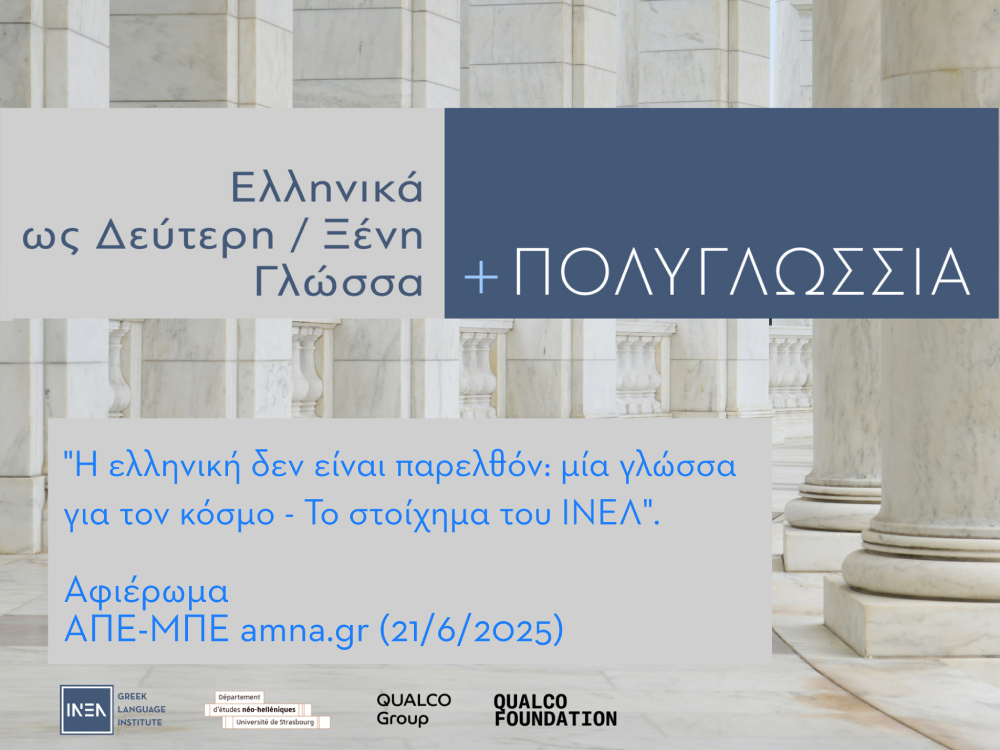(Originally published by the Athens-Macedonian News Agency (amna.gr), June 21, 2025)
Could a language with 4.000 years of history still claim a meaningful place in the future? In a recent feature by the Athens-Macedonian News Agency (amna.gr), Professor Evangelia Georgantzi, President of the of the Greek Language Institute (INEL), shares her deeply held conviction that Greek is not simply a relic of the past, but a living, evolving language with global relevance. With over four decades of experience teaching Greek as a second/foreign language, Georgantzi leads INEL with a vision that blends tradition with innovation, and pedagogy with cultural engagement.
Founded with the support of the Qualco Foundation and Qualco Group, INEL aims to preserve, promote, and expand the use of the Greek language worldwide. As Georgantzi puts it, “Our ambitious but realistic goal is to increase the number of people who speak Greek — not just as a mother tongue, but also as a conscious choice for learning, expression, and cultural experience.”
Greek is currently spoken by around 13–15 million people globally. INEL aspires to grow this community by integrating Greek language education into international educational systems, advancing cultural diplomacy, and creating new digital tools for language learning.
One of the key challenges, according to Georgantzi, lies in engaging younger generations of the Greek diaspora. “If we can persuade language lovers to choose Greek among the languages they want to learn, it will be a great success. Even more so, if the fourth generation of the Greek diaspora understands the importance of keeping their grandparents’ language — not only as heritage, but also as a professional asset — we will have achieved something truly meaningful.”
INEL also embraces technological innovation, but with care. “Technology should support, not replace, the human interaction between teacher and student,” she emphasizes. “What matters is that everything remains centered on pedagogical principles. In the end, the human mind must be the one that orchestrates everything — with balance.”
This approach was powerfully showcased during INEL’s inaugural international conference, held at the Acropolis Museum in Athens. The event exceeded expectations, with participants from 15 countries, including 15 foreign and 5 Greek universities. Rather than presenting Greek as an ancient, static language, the conference highlighted its contemporary educational, cultural, and intercultural potential.
Innovative teaching practices were shared by both Greek and international educators, including the use of AI-powered tools like Kri-Kri — a new Greek-language counterpart to ChatGPT — and platforms like VoiceThread, which enable dynamic digital language learning. Presentations emphasized intercultural mediation, experiential learning, and personalized teaching methods, all adaptable to both Greek public education and diaspora communities.
“Greek offers something unique,” Georgantzi noted. “Its ability to articulate abstract concepts with precision and philosophical depth is one of its most overlooked advantages. It bridges the past with the future — and gives us the tools to think and express ourselves meaningfully today.”
Looking ahead, INEL seeks to institutionalize this conference as a permanent annual event, fostering an ongoing international dialogue. Plans include building a scientific network and strengthening ties with global organizations and Greek-language education institutions abroad.
“Our future depends on whether we see Greek not just as a ‘heritage language,’ but as a tool for expression, creation, and critical thought,” Georgantzi concluded. “The most important ally in this effort is the family — the synergy of family, school, and institutions is the key.”
For Georgantzi and the team at INEL, Greek is more than a language. It is culture, memory, creativity, and promise — a living force with as much to offer the future as it inherits from the past.
The original article in Greek was published by www.amna.gr and can be accessed here.

